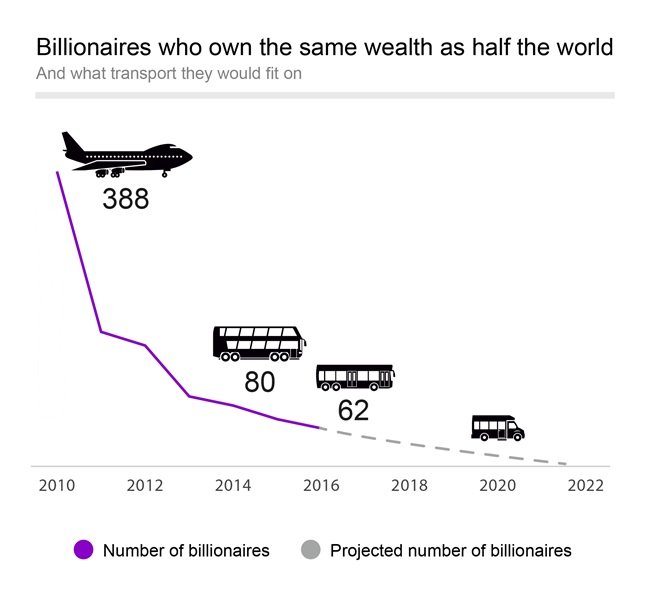
Blockchain technology triggers unease and fear for the world traditional finances and economics. Never then before the concept of money has been challenged and pushed further through the advent of social media, co-creation, the social graph and concepts such as Gamification. These are taking over the established reality and creating a kind of twilight zone.
A few decades after the invention of the internet, we are coming to terms with a strange paradox: even though the web brought information and connectedness to larger numbers of people, as never before, its promises of opportunities and equality for all have failed. The levels of inequality have risen to unimaginable levels, side by side by the economic grow of countries that just 10 years ago were bankrupt.
The rise of the 21st century brings with it a complex world where, in the words of the research of Edward N Wolff, of New York University, “as of 2007, the top 1% of households in America owned 34.6% of all privately held wealth, and the next 19% had 50.5% of the wealth.” According to the Congressional Budget Office, 20% of the world population owned 85% of the wealth, leaving only 15% of the wealth for the bottom 80% of the people (more info can be found in the entry for Wikipedia for the movement Occupy wall Street).
Since then, the wealthy are wealthier and more powerful than ever in history: a minority of one percent of people owns almost half of the global assets. According to an Oxfam report published in 2016, 62 people own as much as the poorest half of the world’s population. The global inequality crisis is reaching new extremes.
These thought-provoking statistics indicate the world schizophrenia and disparity.
The question is how to cope with this massive financial meltdown. What can effectively be done? some action is needed as the situation is unsustainable as it is and it will drive mankind (as we have repeatedly learnt from history) to more and more confrontation, riots, demonstrations, unemployment and at a certain point another possible proliferation of extremist movements and local guerrillas.
What can explain how the mentioned levels of inequality, coexist with a highly technological world where the creation of wealth, commodities, goods, advanced technology and health systems has developed further than in any historical moment before?
As David Kirkpatrick writes, one of the main issues with our present society is that:
“(…) the world lacks enough leaders who understand the potential for new, technology-driven solutions for global problems. To the degree that there is such leadership, it is concentrated in the business community. But even there, an understanding of tech’s potential is disturbingly uneven. Some companies thrive by embracing new methods of marketing, managing, developing products, and engaging with society. Others, by contrast, steadfastly operate in the old ways.”
Unpacking these questions would lead to even more queries. For the moment, I prefer not to say what to do. It would be too arrogant. For me, action can only come with moderation and homework, research and wise thinking. In the past, all attempts to change the world in a radical, violent way just changed the surface.
Any solutions need to bear that in mind that it is not so much about complexity but about simplicity. The present landscape where we live offers and strives to encourage users to engage in desired behaviors in connection with other people alike, and for the first time in history, real time thinkers around the world can connect in fast ways using social media, co-creation, and open thinking. I believe that open government, open business, open data can be fostered by using social tech tools, and other applications that can exchange ideas and funds and try to move things to a better port.
We are in a time where the concept of money is going through a massive revolution. Money is now becoming digital, with new payment systems being built faster than the regulations and political movements, or pension systems thinking. Paradoxically the exchange of currency data, virtual currencies, trading algorithms, peer to peer exchange, advances in software and general semantic engines, algorithms, search and social media technologies are redesigning the way humans will interact with money forever. And all of this is going faster than politicians, governments, organisations realise. If the economy is on the brink and most governments are sitting on the sidelines, unwilling or unable to help there is as well a massive continuous shift and redefinition of the creation of wealth and commodities.
Looking at the Austrian School of economics and its advocacy towards a methodological “individualism” (through a sound action mode experimental research and natural experiments) whereas in interpreting economic developments coming up associated with the theory that the essence of money is non-neutral, and emphasizes the organizing power of the price mechanism it is clear that it is not possible to apply a rational way of looking at the present shift.
However, there is something deeper going on that even the wiser / informed economic and financial players are not understanding. As the Austrian school puts it very well there are not a priori or non-empirical perfect models or solutions.
That is the backdrop scenario of two paradoxical worlds: on one hand we have mega established corporations and recent ones, coming from the startup world of Silicon Valley, New York, Bangalore, Taiwan, Hong Kong, Tokyo, London. The immense wealth of global companies such as Microsoft, Oracle, IBM, Google or Apple could individually bailout a country like Ireland of Portugal. On the other hand the frustration and angry tone of voice of a population increasingly aware of stagnant wages and unacceptable levels of inequality.
Bear in mind though of the interesting paradox emerging in the middle of the dual ecosystem. The increasingly aware population is aware and knowledgeable because of the technology developed by some of those mega-corporations. iPhones, computers, iPads, tablets, and social media platforms Twitter, Facebook, Google+ are providing people with information, resources, connection and organizational tools. They are becoming increasingly aware as well, how companies like facebook and google, are by the end of the day, networked monopolies, that result from the effort of all of us, the users. Their economic profit results from our private data, but the profit of our data is not given back to us. The way to solve this conundrum, might be according to some experts, blockchain technology.
Blockchain technology is the so much needed transparent and trusted technology that enables us to create decentralized applications that cut the middleman and to redistribute and take advantage of all the profit resulting from our data.
Even though it can help a lot, blockchain can not, and will not be, the holy grail for a perfect world. There is no easy solution to the current state of affairs. By the contrary, it all goes down to awareness, an effort to dis-mystify and to have an open spirit. Realising all this it is thus critical to think out of the box.If there is something to change the paradigm is an open way of thinking, a shift towards open personal and open business strategies whereas people are able to interact (through all the fast changing social media platforms, mobile ever increasing powerful devices) and obliged to find solutions in a reasonable way. This is the main challenge democracies, business, finance, banking and the money industry needs to face.
If there is something to change the paradigm is an open way of thinking, a shift towards open personal and open business strategies where people are able to interact (through all the fast changing social media platforms, mobile ever increasing powerful devices) and obliged to find solutions in a reasonable way. This is the main challenge democracies, business, finance, banking and the money industry needs to face.
Disruption, Blockchain, Fintech And The Trust Protocol Part 1
The post Disruption, Blockchain, Fintech And The Trust Protocol Part 2 appeared first on Intelligent Head Quarters.

